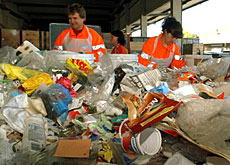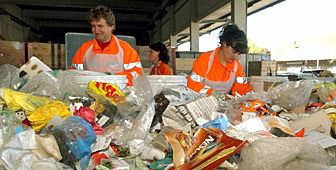Swiss are stuck on their rubbish bag tax

The Swiss are firm believers in the rubbish bag tax, Switzerland’s unique way of disposing of its waste, according to a new survey.
But the system is far more widely applied in the German-speaking part of the country than in the French- and Italian-speaking areas.
The tax means householders have to attach a coloured sticker bought from the local shop to their rubbish bags – instead of paying for waste disposal through their local authority taxes.
Two new studies carried out by the Swiss Environment Agency and published on Thursday found that the principle that the polluter pays is well accepted among the population.
Of the 2,200 people questioned nationwide, almost nine out of ten (88 per cent) thought the system was fair and 87 per cent found the costs – which vary according to the size of the bag – were acceptable.
Even in the areas that do not use the rubbish bag tax, 73 per cent thought that the paying polluter principle was reasonable.
More recycling
Hans-Peter Fahrni, head of the agency’s waste management division, says that the rubbish bag tax has encouraged the Swiss to think more about recycling.
“Both studies [into the composition of waste and the effect of taxes on the number of bags] showed the same effect – it is a very strong incentive for people to separate their waste and to use all possibilities for recycling,” Fahrni told swissinfo.
This is backed up by the figures revealed in the survey – 50 per cent of people admitted to having changed their recycling behaviour after the introduction of the tax.
It also found there was a 15 per cent drop nationwide in the amount of household rubbish over the last ten years despite an almost four per cent increase in the population.
But more litter
But although households have been reducing their waste, there has also been a huge increase in general littering, due to the rising popularity of fast food and takeaways.
The trend particularly affects the Swiss Federal Railways, which clears up 45 tons of litter everyday.
But Fahrni says the rubbish bag tax has not been encouraging people to find other ways to get rid of their waste.
“We’ve found an increase in littering in the past ten years, but we’ve found the same effect too in regions that don’t have the rubbish bag tax. I think this is a change in social behaviour, people eating in the streets and in parks,” he said.
Swiss German system
It is estimated that 70 per cent of Swiss currently use the sticker method for their rubbish.
But the scheme is far more widely accepted in German-speaking Switzerland than in the Italian-speaking area or the French-speaking part – where it is only applied in Fribourg.
Jean-Claude Mermoud, head of the environment department in canton Vaud – where 72 per cent of households still pay for rubbish collection via local taxes – says that the rubbish bag tax has met with some resistance.
“We probably behave differently in western Switzerland, and we need more time, more information to be convinced we should accept these kinds of rules,” he said.
“We have found that in those areas where it has been introduced, there has been support for it and it has yielded results,” he added.
Both Mermoud and Fahrni are convinced that the system will gain in popularity in the French-speaking part in the future and that household waste in general will continue to reduce, as people become even more recycling conscious.
swissinfo, Isobel Johnson and Jonathan Summerton
88 per cent thought the rubbish bag tax system was fair.
87 per cent found the costs acceptable.
50 per cent changed their recycling behaviour after the introduction of the tax.
There was a 15 per cent drop in the amount of household rubbish over the last ten years despite an almost four per cent population increase.

In compliance with the JTI standards
More: SWI swissinfo.ch certified by the Journalism Trust Initiative


You can find an overview of ongoing debates with our journalists here. Please join us!
If you want to start a conversation about a topic raised in this article or want to report factual errors, email us at english@swissinfo.ch.